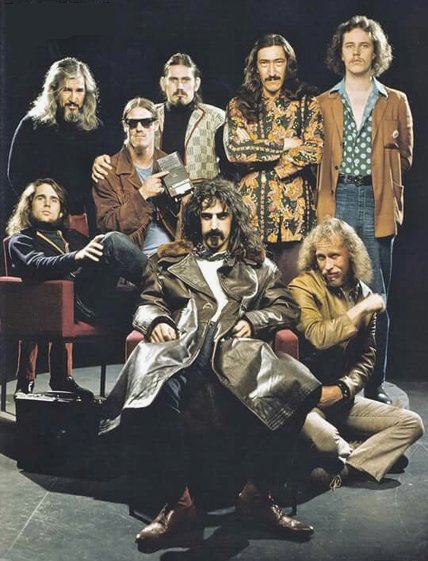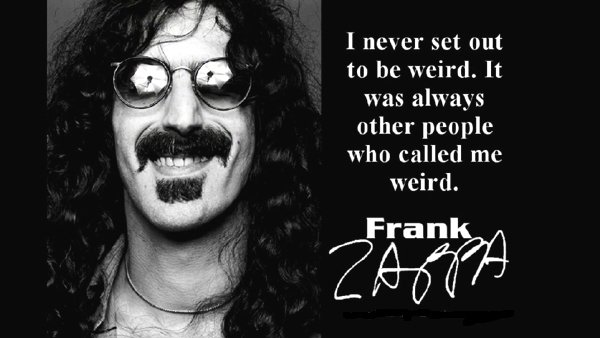The Legend of the Golden Arches and The Dog Breath Variations
The Legend of the Golden Arches
The Mothers of Invention: Frank Zappa (low vocals, electric guitar, percussion), Ray Collins (high-pitched vocals), Ian Underwood (alto and baritone saxes, flute, clarinet, piano, electronic organ, harpsichord, celeste), Bunk Gardner (alto, tenor and soprano saxes, flute, piccolo, clarinet and bass clarinet, bassoon), Don Preston (electric piano), Roy Estrada (electric bass), Jimmy Carl Black (drums) and Art Tripp (drums, timpani, vibraphone, xylophone, marimba, wood blocks, bells, small chimes). From the album Uncle Meat (1969).
Frank Zappa was a self-taught songwritter and performer, and his music is difficult to classify. During his adolescence he liked rhythm and blues, doo-wop and the classical composers of the twentieth century. During high school he wrote classical music and played drums in rhythm and blues bands, although later he switched to electric guitar. In 1966 he released his first album Freak Out! with the Mothers of Invention, combining rock & roll with studio-produced sounds and collective improvisations. He was always experimenting no matter what he played, whether it was jazz, rock or classical music.

Frank Zappa with the Mothers of Invention
Zappa embraced his work in a conceptual continuity he called “Project/Object”, composed of characters, topics and musical phrases repeated throughout his albums. His lyrics express his unconformist opinion of established political and social movements in a humorous way. Some critics considered him the godfather of comedy rock, which incorporates parody and satire. During the 1950s Stan Freberg was one of the first to play this kind of music with which he made fun of The Platters, Elvis Presley and other famous artists of his time, and some comedians in the United Kingdom achieved significant success.

Also Zappa was supportive of self-education, freedom of expression, the abolition of censorship and political participation, and opposed organized religion and conventional education. After trying marijuana he rejected the use of drugs contradicting other rock musicians, but endorsed their legalization and regulation. Zappa was a very productive and controversial artist. His supporters praised the compositional sophistication of his music while his opponents thought it lacked emotional intensity. In 1994, critics of jazz magazine DownBeat placed Zappa in their Hall of Fame, in 1995 he entered the Rock & Roll Hall of Fame and in 1997 he received the Grammy Lifetime Achievement.


Your post has been supported and upvoted from the Classical Music community on Steemit as it appears to be of interest to our community. We also support jazz and folk music posts!
If you enjoy our support of the #classical-music community, please consider a small upvote to help grow the support account!
You can find details about us below.
The classical music community at #classical-music and Discord. Follow our community accounts @classical-music and @classical-radio or follow our curation trail (classical-radio) at SteemAuto!
Delegation links: 10SP, 25SP, 50SP, 75SP, 100SP, 150SP, 200SP, 250SP, 500SP, 1000SP